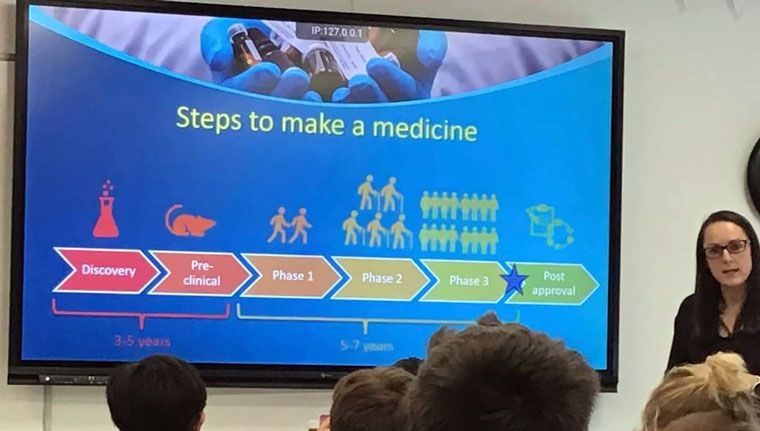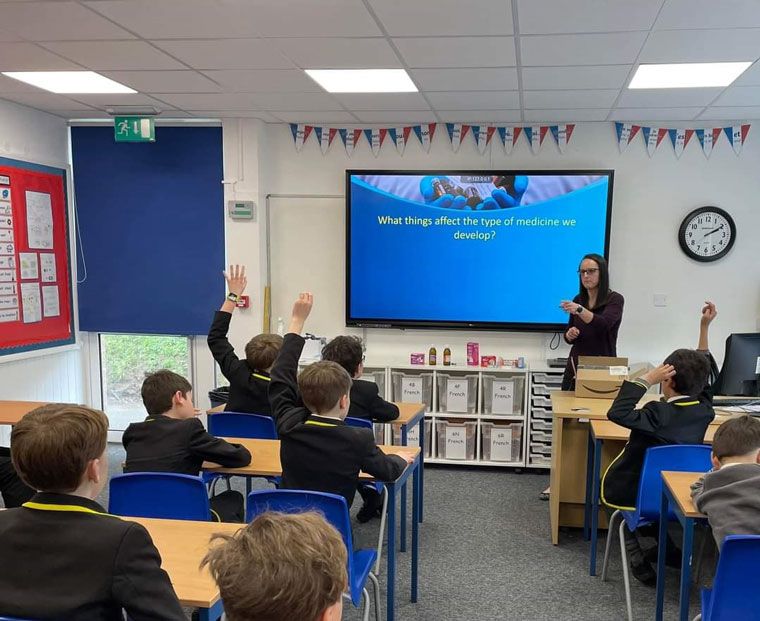
By Kim Hacquoil, Exploristics Chief Data Scientific Officer
A while back, the science lead at my son’s school asked if any parents working in science jobs would be willing to come and talk to the children about what they do as part of British Science Week. Initially I thought that this didn’t apply to me in my role as a statistician but then I challenged myself on my gut reaction. I am not only a statistician, but I am also a drug developer and of course I can talk to them about this exciting industry.
So off I went with my presentation and a box full of “drugs” (empty boxes, bottles, and placebo inhalers) to talk to the children. I remembered a few courses I had previously been on about storytelling and presentations and wanted to apply this to ensure the session was engaging for them. What would they find interesting? What would surprise or shock them? And what were the three key things I wanted them to go home and talk to their parents about?
I started off by showing them two Calpol bottles (+2 months and +6 years) and asking them to tell me what they were, what they did and how did they know it was ok to take as a medicine. We also talked about the difference between them and why they were different. This sparked lots of enthusiasm, and they had some great insights which showed they were really thinking about the topic.
I then asked them how long they thought it would take to develop a medicine and give it to patients. Most guesses were around 1-5 years and I wish I could have captured their faces when I told them that on average it was longer than they had been alive! I talked them through each stage of the drug development process including how many compounds are needed to get just one that is approved. Again, this was another surprise at how many drugs fail in the process. We also discussed how experiments and statisticians play a key role in the evidence generated for each phase.

I finished with getting them to name all the different ways we could get a medicine into the body, and they showed a great understanding and awareness of the different types of medicines. We also discussed how it’s important to make a medicine that is right for the disease and patients it’s trying to treat. The children were asking some fantastic questions which showed they were thinking beyond and questioning what I was telling them. The question as to how the COVID vaccine didn’t take long to develop was a recurring one and each time brought a smile to my face as it showed curiosity and inquisitiveness.
So, what did I get out of this? It reminded me of three important things:
- It’s really hard to develop medicines, there is a lot of failure. It’s vital that statisticians drive effective design of studies to help them to succeed when they should succeed and stop early when they are ineffective (or not even run a study in the first place).
- This industry is a truly stimulating one. Explaining the long and complicated process to discover and develop new medicines is quite amazing and reminded me just how important the work that we do is.
- We should never stop challenging, asking questions, and being curious and inquisitive. That’s how we will innovate, that’s how we will speed up cycle times and reduce attrition rates in drug discovery and that’s how we will do the best for the patients that need us.
I feel very proud to work as a drug developer and I hope I inspired the children to think about the opportunities in this industry as they learn, grow, and find their own rewarding careers.




